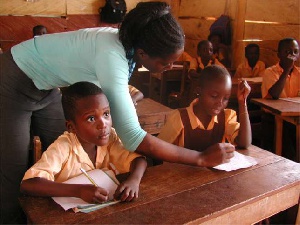All primary school pupils in the country are expected to begin learning climate change and green economy subject areas at the beginning of the academic year in September this year.
As a result, the Environmental Protection Agency is expected to train teachers across the country with Teaching and Learning Materials (TLMs) before the academic year starts.
The objective is to improve knowledge and help change behaviours of both children and adults towards the environment and to help in the fight against the impact of climate change in the country.
Speaking at a presentation of TLMs to staff of the Environmental Protection Agency (EPA) and the working group, Mr John Pwamang, Acting Executive Director of EPA said the effort was to enable the Agency to incorporate climate change into school curricula as part of the strategy to implement the national climate change policy.
The event was also to solicit input for review of the TLMs by the National stakeholders and international experts. Mr Pwamang said ‘climate change is very critical and the best way is to start from the primary school system’
He expressed gratitude to the Ghana Education Service for partnering EPA to ensure that everything was achieved adding that with the support from United Nations Institute for Training and Research (UNITAR) when the learning materials were embedded in the system the children would use.
Dr Tachie Obeng, National Focal Person on Climate Change Education and Awareness Creation said however that it was new and required capacity development a new challenges to the existing capacity to improve knowledge values, behaviours and practical skills needed to be able to contribute responsibly and effectively to manage the quality of the environment by preventing and solving environmental problems.
He indicated that it was in line with this that Ministry of Environment Science Technology and Innovation in collaboration with EPA among other stakeholders developed and launched a multi-sectorial national climate change and green economy learning strategy in 2016 to foster systematic and country-driven
“The national learning strategy considers general education as 6th climate change priority area for capacity building within the formal and non-formal educational systems.”
He said one of the learning actions of this policy area was the integration of climate change and green economy into school curricula.
Following the development of the learning strategy, a national working group was set up in 2017 to implement the education sector programme of the learning strategy. He noted that as a result, climate change and green economy were integrated into the new Ghanaian primary school curricula and teaching and learning materials tailored to the new curricula were being developed by the climate change unit of EPA, National Council for curriculum and assessment of the Ghana Education service and UNITAR.
He said ten posters had so far been designed to be used to educate the pupils, highlighting such issues as religious and moral to reflect on the purpose of God’s creation.
The posters are meant to tell a story on how to fight climate change, especially with bush burning, illegal mining (galamsey), open defecation, cutting down of trees, dumping of waste in water bodies among others.
He therefore urged the stakeholders to add their inputs so that the Agency would come out with posters that would be well understood by all.
General News of Friday, 17 May 2019
Source: GNA













